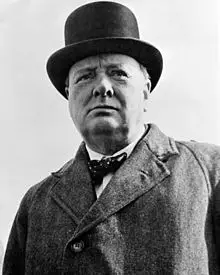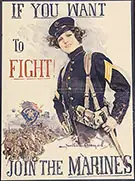Winston Churchill
Winston Churchill was chosen as one of the most influential leaders of all time. He was the prime minister of Britain during World War II and was also involved in the government during World War I. Churchill was a leader, a historian, a writer and a painter. He even won the Nobel Prize for literature in 1953.


Early Years
Churchill was born on November 30, 1874. He was educated in Ireland and was not a very good student. He typically got poor grades and when he was old enough to join Sandhurst (a military academy), he went against his father’s wishes and joined the cavalry. His father wanted him to join the infantry. He actually did well in the cavalry and graduated eighth in his class.
It was in Sandhurst that Churchill began to write and he would often write about the battles he was involved in. His first book, The Story of the Malakand Field Force, covered his time in India. He also wrote book about his time in Sudan as well as South Africa.

Politics
Churchill entered politics in 1901 by winning the seat at Oldham for the Conservatives, although, he switched parties and joined the Liberals in 1904. Churchill rose in the government after successfully dealing with a number of difficult situations such as the miner’s strike in Tonypandy and the Siege of Sidney Street.
In 1911, Churchill was made the First Lord of the Admiralty and he did his best to ensure that the navy would be ready for the outbreak of World War I. He ordered the development of new ships and submarines as well as the development of a naval air service.

World War I
Churchill ordered the seizure of two Turkish battleships that were being built in British shipyards so they could be not be used against Britain in the war. Churchill was worried that Turkey was negotiating with Germany about becoming an ally in the war. Turkey was actually in negotiations with both Germany and England and many scholars believe that Churchill’s decision to seize the warships pushed the Turks towards Germany.

Gallipoli (The Dardanelles)
Churchill was the main designer of the Gallipoli campaign which was designed to take control of the Dardanelle Straits which were currently controlled by Turkey. This would open up a supply route for Russia and take Turkey out of the war. The campaign, which took place in early 1915, was a disaster and over 73,000 Allied soldiers were either wounded or killed.
Churchill was blamed for the disaster and was removed from his post as First Lord of the Admiralty. He remained in government but did not hold any major position of power until after the war.

World War II
When Hitler came to power in 1933, Churchill gave a number of speeches warning the government and the population at large about the dangers that Hitler posed. Unfortunately, few people agreed with him. Churchill argued against the Munich Agreement, which gave Germany part of Czechoslovakia (which Czechoslovakia did not agree with) and he argued that Germany would attempt to gain even more territory.
When Hitler invaded Poland and war was declared, Churchill was given a spot on the war cabinet and was renamed the First Lord of the Admiralty. When Hitler invaded Norway and defeated the Allied forces, the prime minister, Neville Chamberlain, resigned after a poor showing in a no-confidence vote. As a result, Winston Churchill was named the next prime minister in 1940.

Churchill established the SOE (Special Operations Executive) which ran secret missions in German-held territory. He also set up the Commando forces which developed into the Special Forces.
When German forces invaded France, the British Expeditionary Force (BEF) had been sent in to help but ended up having to retreat. The BEF was trapped on the French coastline and had to be evacuated over the course of nine days. Over 300,000 men were evacuated but they had to leave a lot of equipment behind.
France requested that Churchill send British fighter planes to help hold off the German invasion but he refused. Churchill recognized that the fighter squadrons would not be very effective in holding off the German invasion and he also realized that he would need these fighters to protect Britain from German attack.

Battle of Britain
Once Hitler had control of France, he began to make plans for the invasion of England. Hitler ordered bombing raids on the country. These raids were initially focused on coastal airfields and other military targets (such as radar installations) but the raids soon bombed further inland. The German bombers were told not to bomb cities but after they mistakenly bombed the outskirts of London, Churchill ordered the bombing of German cities. Hitler followed with similar orders to bomb English cities.
Churchill gave a number of speeches during the Battle of Britain aimed at building up the morale of the population and the armed forces. The British air force was able to hold off the attacks and once Churchill realized that Hitler would not be able to invade England, he was able to send troops to shore up battalions fighting elsewhere.

Attack in French Algiers
Churchill was worried that the French fleet, which was stationed in French Algeria, would be given to the Germans, since the Germans now had control of France. The French Admiral stated that the fleet would not fall into German hands but Churchill decided that he couldn’t take the risk. He ordered the British Navy to attack the French fleet while it was at dock. The attack occurred on July 3, 1940 and resulted in the destruction of a number of ships and the deaths of almost 1,300 French sailors.

The Search for Allies
Churchill recognized that he needed allies if England was to defeat Germany. He approached the United States, which was officially neutral. The American government refused to join the war at this time but did agree to sell supplies. The United States entered the war after the Japanese attack at Pearl Harbour and they became an important ally for Churchill’s fight.
Churchill was very anti-communist but he approached the Soviet Union in an effort to ally their forces. Stalin (the leader of the Soviet Union) agreed to join forces after Germany attacked the Soviet Union. Britain then began to send supplies to the Soviet Union.
Churchill had to work hard to make the alliance work. He attended a number of meetings and strategy sessions to discuss how the war was to be conducted. Churchill travelled over 160,000 kilometers during the war in order to attend these meetings. At these meetings, Churchill and the other allies came to a number of agreements regarding who would get what at the end of the war. Essentially, the world was divided up by the Allies.

Bombing Campaign
Churchill had ordered the bombing of German cities during the Battle of Britain and this bombing continued throughout the war. Some of the cities that Churchill ordered bombed included Lubeck, Hamburg, and Dresden. In Dresden, between 25,000 and 40,000 people died.

Normandy Invasion
While the Normandy invasion was being planned, Churchill demanded that the invasion be postponed until winning was assured through the use of overwhelming force. To meet this demand, the invasion was put off until June 1944. This delay allowed the Soviets to gain the lead in capturing Nazi-held territory and although Churchill wanted a swifter advance once the forces had landed, Eisenhower, the supreme allied commander, insisted on a slower approach. This allowed the Soviets to reach Berlin, Budapest, Vienna, and Prague first.
Churchill did send British soldiers to Greece to intervene in the civil war there so that the communists would not take over the country. By stopping the communists in Greece, Churchill also ensured that the communists would not be able to take over Turkey.
Churchill helped organize Operation Fortitude which was designed to confuse the Germans about where the invasion was going to take place. This operation caused the Germans to waste resources in order to hold off possible attacks in different places.

The End of the War
The war was nearing the end and Churchill became concerned about the Soviet Union. He had plans drawn up for an attack on the Soviet Union but it was decided that the plan would not work given the Soviet Union’s greater number of soldiers.
An election shortly after the war resulted in Churchill losing as prime minister and while he was out of power, he continued to warn people about against the threat posed by the Soviet Union but few people were willing to take the necessary steps to push back the Soviet Union.
Churchill became prime minister again in 1951 when the Conservatives won the election. Unfortunately, he had suffered a stroke in 1953 and, although, he continued to rule for a few more years, he decided that his health would not allow him to continue as prime minister. He resigned in 1955 and the queen offered to make him a duke but he refused. He remained in parliament until 1964 although he rarely attended parliamentary sessions.
 Death
Death
Churchill died on January 24, 1965. His funeral was broadcast live and was viewed by over 350 million people. The queen as well as representatives from over one hundred countries attended the funeral. During the funeral procession, thousands of people quietly lined the streets to watch the body pass.



